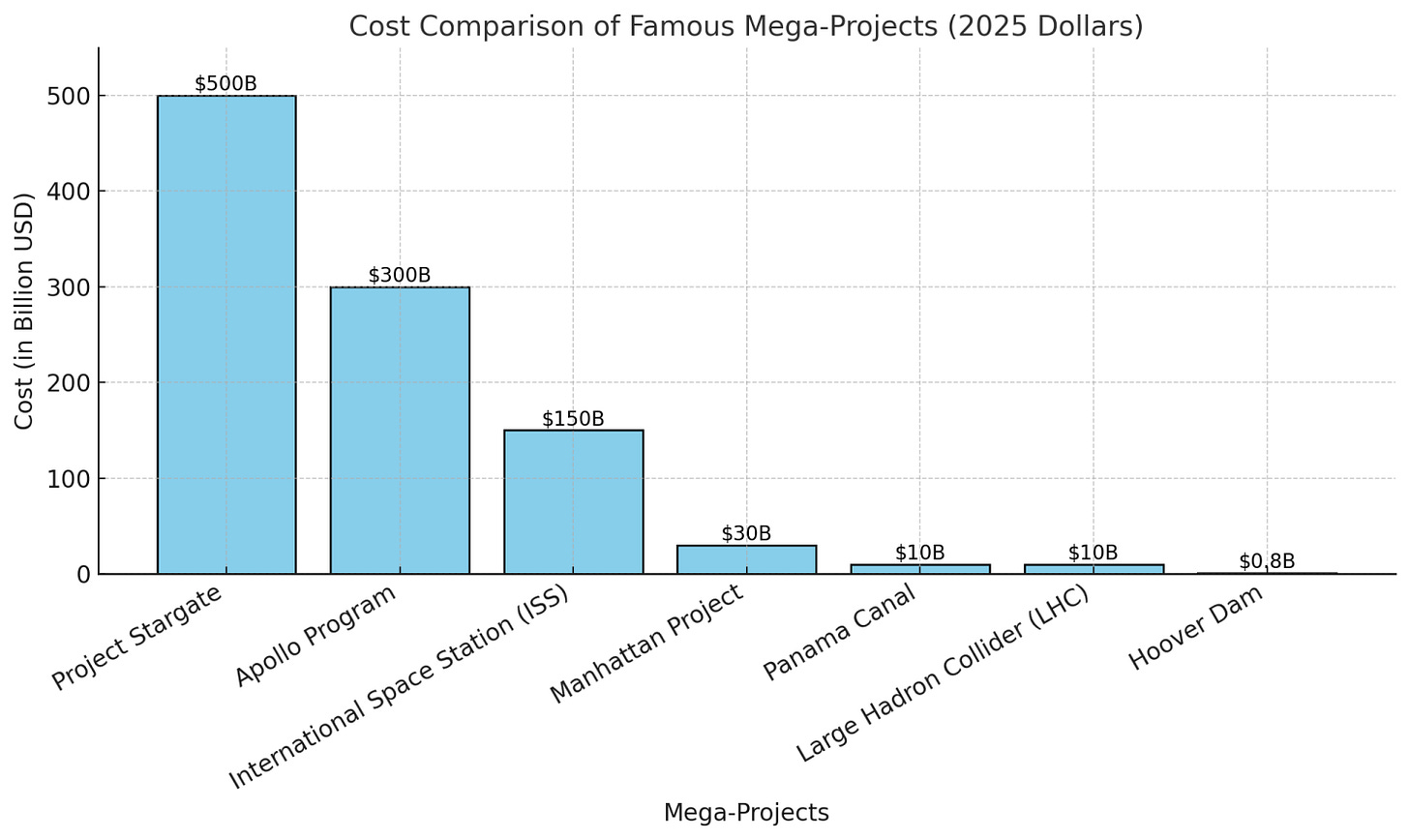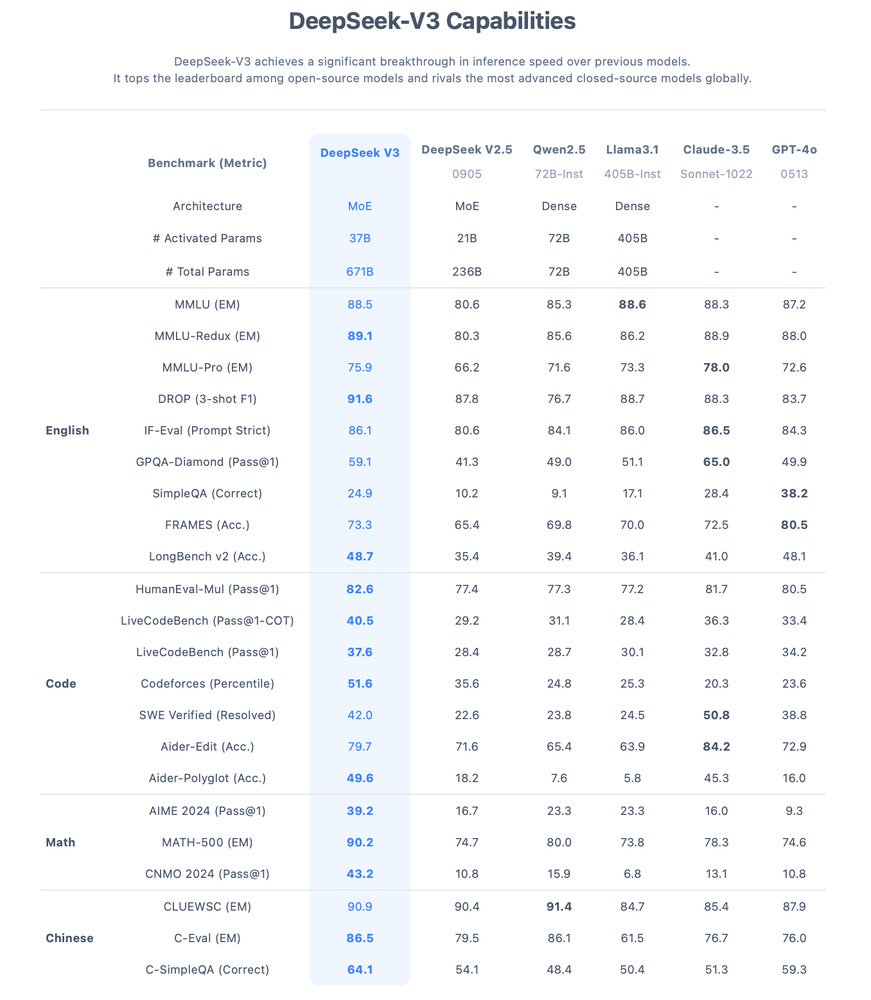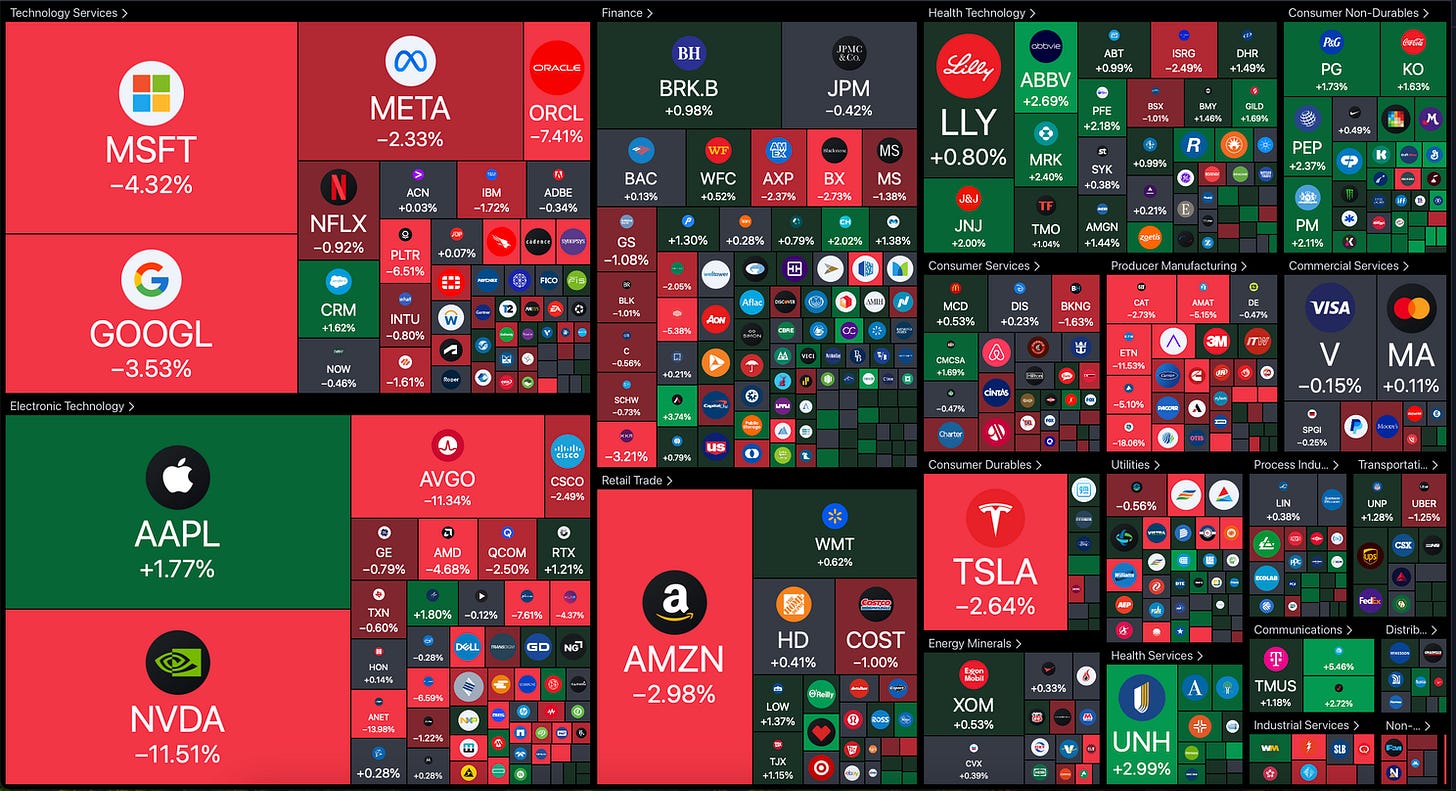✍️ In This Issue ✍️
Latest News in AI: Project Stargate, DeepSeek, Tencent, Goldman Sachs, OpenAI, Anthropic and Alphabet
Deep Dive: DeepSeek Just Crashed Stargate - New Chapter in the AI Race?
AI Tools We Love: OpenAI's Operator
Culture Corner: Stargate
Quote for You: Charlie Munger💡
Latest News in AI
🌕 Stargate Infrastructure Deal Announced. A massive $500 billion AI infrastructure investment in the U.S. was announced with backing from OpenAI, SoftBank, and Oracle. The project, which includes building 100,000 new jobs and advanced data centers, aims to strengthen America’s leadership in AI development. Construction on the first data center has already begun in Texas. But is such an investment future-proof? See the next one...
🤖 DeepSeek Unveils Cost-Effective Rival to OpenAI. DeepSeek has announced its latest large language model (LLM), claiming it rivals OpenAI's best models while delivering results at a fraction of the cost. The new model, designed to be highly efficient in both training and deployment, reportedly outperforms OpenAI’s offerings across several key benchmarks, including accuracy and reasoning tasks. DeepSeek’s focus on affordability and performance could make it a disruptive force in the AI landscape, especially as organizations seek budget-friendly yet powerful AI solutions. A huge kick in the nuts for Project Stargate... How big it is, I will discuss in my deep dive article. Read on!
🚀 ByteDance Challenges OpenAI with Doubao-1.5-pro. DeepSeek is not alone. ByteDance, the parent company of TikTok, has unveiled its advanced reasoning model, Doubao-1.5-pro, which reportedly outperforms OpenAI’s o1 on the AIME benchmark. This marks the second major AI advancement from China this week, following DeepSeek’s open-source R1 model.
🎨 Tencent Unveils Hunyuan3D 2.0. Chinese tech giant Tencent has released Hunyuan3D 2.0, an open-source AI model capable of generating 3D objects from images or text in seconds. This advancement could open up new possibilities for industries like gaming, design, and animation.
📈 Goldman Sachs Introduces AI Assistant Goldman Sachs is rolling out a new AI assistant to 10,000 employees. The tool simplifies tasks such as summarizing emails and translating documents, with advanced features expected to follow. It reflects a growing trend of AI adoption in the finance industry.
🛠️ OpenAI’s Operator Tool Set for Launch. The long-awaited Operator tool by OpenAI, which enables ChatGPT to handle agent-like tasks such as making reservations and planning itineraries, has been launched for Pro users in the US. Other tiers will follow. The tool could redefine personal assistant technology by introducing new levels of automation.
⏳ OpenAI's o3-mini Model Nears Launch. OpenAI doesn't stop here. Sam Altman announced that OpenAI’s o3-mini model will be available to Plus subscribers within weeks. The update is expected to offer improved performance and pave the way for broader adoption.
🎥 Adobe Premiere Pro Introduces Media Intelligence. Adobe’s latest AI-driven feature, Media Intelligence, allows Premiere Pro users to search video clips by describing them. The update also includes a translation tool supporting captions in 17 languages, streamlining video editing workflows.
💻 Chromebooks Get Accessibility Upgrade. Alphabet has rolled out a new feature for ChromeOS that lets users control Chromebooks using head movements and facial expressions. This innovation is designed to assist people with motor impairments, marking a significant step in accessibility technology.
🧠 AGI Progress and Speculation Intensify. Despite skepticism about AGI (artificial general intelligence) timelines, researchers suggest it might be closer than expected. Axios revealed that Sam Altman will attend a confidential meeting in Washington on January 30. Altman tempered expectations, tweeting that AGI isn't imminent, though critics pointed to his role in fueling AGI-related hype.
🔊 Anthropic Explores Voice Interaction and AGI Predictions. Anthropic CEO Dario Amodei revealed plans for a voice-based feature enabling conversational interaction with Claude models. He also predicted AI could surpass human intelligence by 2027, reigniting AGI debates. Meanwhile, Nobel laureate Demis Hassabis shared that AI-designed drugs may enter clinical trials this year.
💰 Alphabet Increases Investment in Anthropic. Google’s parent company, Alphabet, is reportedly injecting another $1 billion into Anthropic, the developer behind the Claude AI models. This funding will enhance Anthropic's computing capabilities, though Alphabet’s $3 billion total stake still lags behind Amazon’s $8 billion investment. With the departure of Lina Khan from the FTC, experts predict more major tech investment deals on the horizon.
❄️ AI Joins X Games Judging For the first time, the X Games will feature an AI-powered judge for snowboard superpipe events. While human judges retain final authority, this innovation highlights AI’s growing role in sports evaluation.
Deep Dive: DeepSeek Just Crashed Stargate - New Chapter in the AI Race?
Project Stargate: Securing U.S. AI Dominance
One of the first things that President Trump has announced after the inauguration was Project Stargate. Together with his tech gurus and supporters, Sam Altman, Satya NAdella and other he announced that the U.S. will spend 500 billion USD on the largest AI endeavour ever. To imagine the scale of this project, I have collected some remarkable mega projects from the past. All values are in 2025's money.
Do you think, that landing on the Moon was a big deal? Or the ISS that served astrounauts and space exploration for so long? Or building the first nuclear bomb in the Manhattan Project was huge? Or building the Large Hadron Collider, that lead us to many major scientific findings? Well, the money we have spent on these is peanuts compared to Project Stargate. We have spent on these combined less than the Project Stargate alone.
Ironically, AI is such a fast evolving are, that short after the big announcement, we got another - this time from China.
DeepSeek Crashes Stargate: A Disruptive Shift in the AI Landscape
Over the past week, the AI community has been abuzz with the launch of DeepSeek V3, an open-source large language model that has made waves across the tech world. Why? Because DeepSeek's model can reach or even outperform the market leaders, while its development costs are the fraction of those.
Here are some interesting test results:
While the open-source community has embraced the new model with enthusiasm, tech giants reliant on closed-source systems are reeling from its disruptive potential. Even mainstream media is starting to recognize the significance of DeepSeek, as it poses a credible challenge to industry titans like OpenAI and their ambitious $500 billion Stargate project.
What Makes DeepSeek Stand Out?
DeepSeek V3 has captivated attention due to its efficiency and versatility. Unlike its competitors, it achieves high levels of reasoning and problem-solving without requiring vast computational resources. Armen Aghajanyan, a former Microsoft engineer, highlighted that while U.S. companies poured massive compute power into their models, DeepSeek innovated by using clever shortcuts and used guided learning to achieve similar or even superior results. This efficient approach challenges the status quo, sparking debates over whether resource-heavy strategies are truly necessary or simply wasteful.
DeepSeek's development cost has been another focal point of discussion. Industry estimates suggest that OpenAI’s GPT-4 required tens of millions of dollars (most probably over a 100 for GPT 4o alone!) in compute and resources for training. In contrast, DeepSeek's model was built at a fraction of that cost, about 6 million USD, thanks to its innovative training techniques and resource-efficient design. This cost disparity is a game-changer, opening the door for smaller organizations to compete in the AI space.
The open-source community has already demonstrated DeepSeek's model's capabilities through various projects, such as:
Developing fully 3D games from scratch.
Coding complex applications like a piano app with just one prompt.
Building clones of popular platforms like Perplexity.
Running it on mobile devices, an impressive feat given its complexity.
Solving reasoning tasks that rival OpenAI’s o1 model for a fraction of the cost.
DeepSeek’s innovative approach involved guiding the model through multiple stages of training, enabling it to develop advanced reasoning skills by using simply reinforcement learning—a process reminiscent of how humans learn. This contrasts with the brute-force training methods used by many leading AI firms, which rely on vast datasets and compute power.
And DeepSeek isn't the only Chinese company, transforming the AI landscape.
Alibaba's Qwen models are the most downloaded on Hugging Face.
Most of the best video models are Chinese, including Hunyuan (the next best video model behind Google’s Veo 2)
The Stargate Project: Ambition Meets Competition
When the Stargate project was first announced, the stock market reacted with enthusiasm, envisioning over a decade of golden-age advancements in AI. Stargate was celebrated as not only a transformative economic initiative but also a geopolitical move. Policymakers likened AI to the new "nuclear warhead," a technology that would determine global dominance for decades to come. Whoever leads the AI race, the thinking went, would shape the political, economic, and military landscape of the future.
With a $500 billion budget, Stargate aimed to secure the United States' leadership in AI through the construction of advanced data centers and the creation of tens of thousands of jobs. It was as much a strategic power play as it was a technological investment. However, the emergence of DeepSeek —a cheaper, faster, and highly efficient alternative—has presented a new kind of challenge to the U.S.’s AI ambitions.
Will it stop the Stargate Project? I don't think so. Trump is so obsessed with American Exceptionalism lead by the tech giants, that he would probably never change his mind on that. MAjor economic forces are very supportive for this initiative. It can boost tech and energy sectors and create jobs and prosperity for many. If the market also thinks so.
Consequences for the Market
The ripple effects of DeepSeeks product launch are already being felt. The U.S. stock market, which initially soared with the promise of Stargate, has today experienced turbulence as investors grapple with the implications of a disruptive competitor.
One of the biggest losers is, of course Nvidia, the giant chip maker, that powers over 75% of AI developments worldwide. Even DeepSeek's model have been trained on Nvidia chips - but not on the latest (and most expensive) ones, but older, less capable models.
Of course, on bad day on the stock market is not the end of the world. But dramatic changes often start with a few bad days. Historically, we’ve seen similar scenarios where smaller, faster, and cheaper competitors overtook heavily funded incumbents in a surprisingly rapid way (if we can talk about incumbents in the rapidly evolving AI landscape at all).
Some examples:
The Personal Computing Revolution: In the 1980s, companies like IBM invested heavily in large mainframe systems, only to be overtaken by agile competitors such as Apple and Microsoft, who focused on personal computers.
The Rise of Budget Airlines: Legacy airlines once dominated the aviation industry, but budget carriers like Ryanair and Southwest disrupted the market by offering affordable, no-frills travel.
The Smartphone Market: Nokia and BlackBerry, early leaders in mobile technology, were outpaced by Apple and Android’s more innovative and adaptable ecosystems.
These examples demonstrate that massive investments don’t always guarantee success, particularly when leaner competitors can innovate faster and more efficiently. And China's open source based, communit driven approach is a real danger to the current market leaders.
Final Thoughts
DeepSeek's story is a wake-up call for the AI industry. It challenges the notion that bigger budgets and more compute power guarantee better results. By delivering comparable capabilities at a fraction of the cost, its model has demonstrated the potential of innovative, resource-efficient AI development.
And the wake-up call seems to be working. OpenAI just announced that its latest o3 mini model will be available for all users for free! As the dust settles, companies investing in massive projects like Stargate may need to rethink their strategies to remain competitive. The rise of DeepSeek's highlights a growing demand for democratized AI solutions, where advanced technology is accessible to a broader audience.
At first glance, this seems like a significant threat to closed-model companies like OpenAI and Anthropic, which have poured billions into AI training. However, the reality may be more nuanced. If the best models become commoditized, the companies with the most computing power and chips—like OpenAI—could still retain a competitive edge. Their infrastructure and access to advanced hardware may allow them to scale and deploy AI systems more efficiently, maintaining a leadership position in the industry.
Fears about political censorship in the new model are valid but may be overblown. Since the model is open-source, users should be able to fine-tune it to their preferences, addressing concerns about bias and control. This flexibility positions R1 as a powerful tool for innovation and customization, fostering a more inclusive AI ecosystem.
There’s also a crucial geopolitical angle. The American chip export ban on China does not appear to be having its intended effect. Despite efforts to restrict access, China continues to make strides in AI development, leveraging alternative strategies and resources. This dynamic raises questions about the effectiveness of current policies and the broader implications for global competition in AI.
While it’s too early to declare a definitive winner in the AI race, one thing is certain: adaptability will be the key to survival. The rise of models like DeepSeek underscores the importance of innovation, efficiency, and accessibility in shaping the future of artificial intelligence. As the U.S. grapples with this new competitive reality, the AI landscape is poised for a dramatic shift.
AI Tools We Love: OpenAI's Operator
OpenAI’s New Agent for Real-World Tasks
Operator can handle tasks like booking a tour of historic Rome for you, according to OpenAI.
If it thinks, writes, and navigates the web like a human, could it be… OpenAI’s latest Operator agent? While it hasn’t reached human-level capabilities just yet, Operator’s advanced features demonstrate significant progress in LLMs’ ability to perform real-world tasks independently—a notable step toward AGI.
Here’s what Operator can do:
Use a photo of your shopping list to order groceries from your chosen store
Find tickets to an NBA game while staying within your budget
Order a pizza with your preferred toppings from your favorite restaurant
Remember details like your zip code for more personalized results
Perform multiple tasks simultaneously, with notifications as each task is completed
Before Operator takes major actions, such as confirming a restaurant reservation, you’ll have a chance to intervene. It avoids certain websites and won’t respond to harmful or dangerous queries. However, it’s not flawless, and OpenAI is working on ways to ensure Operator stays within safe limits.
Operator is currently available to Pro users in the U.S., with access for Plus subscribers expected in the coming months.
Culture Corner: Stargate
The 1994 sci-fi classic Stargate, starring Kurt Russell as the hardened Colonel Jack O'Neil, is more than just an action-packed journey to alien worlds—it's a timeless symbol of humanity's daring curiosity and desire to explore the unknown. With its mysterious portal unlocking access to distant galaxies, Stargate captivated audiences and became a metaphor for venturing into uncharted territories.
Today, the film’s themes resonate even more profoundly as we stand at the threshold of a new era shaped by artificial intelligence. It’s no coincidence that former President Trump’s ambitious Stargate project—aiming to create the world’s most advanced AI—borrows its name from this iconic film. Like the movie’s portal, AI represents a gateway to limitless possibilities and unimaginable futures.
Yet, as Stargate reminds us, new worlds are not without their dangers. The film’s heroes ventured into an alien land fraught with challenges, much like the complex ethical and societal questions AI forces us to confront today. The lesson is clear: the journey into the unknown requires courage, collaboration, and caution.
Stargate is a mirror reflecting our greatest ambitions and fears. As we take our first steps into the AI-driven future, its message feels as relevant as ever: the greatest adventures often begin with a leap into the unknown.
Quote for You
The AI world and all related stocks have been shaken this week. In such times it's always good to remember, that volatility lies in the nature of the markets, and it's not necessarily bad. What volatility can cause, is another thing...
"Volatility is not a risk we care about. What we care about is avoiding the permanent loss of capital." — Charlie Munger
Charles Thomas Munger (January 1, 1924 – November 28, 2023) was an American businessman, investor, and philanthropist. He was vice chairman of Berkshire Hathaway, the conglomerate controlled by Warren Buffett, from 1978 until his death in 2023. Buffett described Munger as his closest partner and right-hand man, and credited him with being the "architect" of modern Berkshire Hathaway's business philosophy.
Before partnering with Buffett, Munger built a successful career as a real estate attorney in California, but his passion for investing eventually led him to leave law and focus on business. His approach to investing is deeply rooted in rationality, long-term thinking, and rigorous analysis. Munger is a strong advocate of understanding the "mental models" that drive decision-making, borrowing insights from disciplines like psychology, history, and economics to create a multidisciplinary framework for success. His unique ability to synthesize these ideas has had a profound impact on Buffett and the overall Berkshire Hathaway strategy.
Munger is also known for his wit, no-nonsense wisdom, and sharp critiques of speculative behavior in the markets. He often emphasizes the importance of ethical behavior, patience, and intellectual honesty. Beyond his work at Berkshire Hathaway, Munger has served as Chairman of Wesco Financial Corporation and as a significant contributor to philanthropy, particularly in the fields of education and healthcare.
Munger's influence extends far beyond investing. His speeches, writings, and pithy quotes – like “The big money is not in the buying and the selling, but in the waiting” – have inspired countless individuals to think critically, act with discipline, and strive for continuous self-improvement. His legacy continues to shape the principles of business and investing for future generations.
I hope, you liked this piece.
Thanks for reading!
✌️Until next time!
Zoltan
🔔 Follow me on LinkedIn and subscribe to receive regular updates on AI, tech and digital transformation topics for managers and leaders.
🚀 Join me on Substack for the full experience, including the archive, deep dives, resources and podcasts — for free! 🚀
👉 In case you missed something, check out my latest articles:







